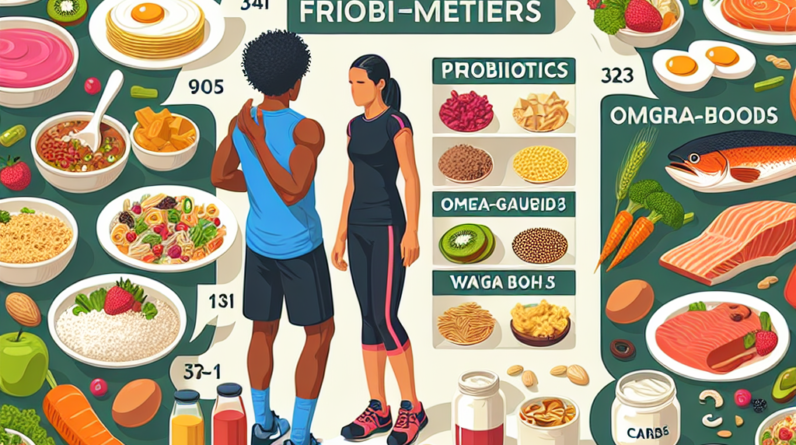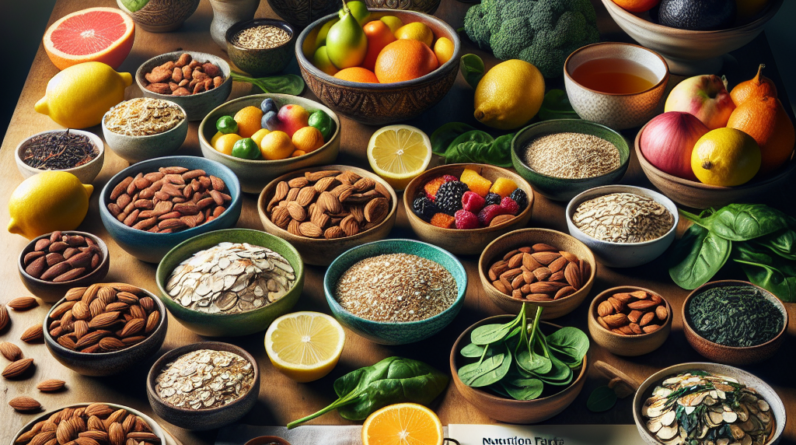
Understanding Nutritional Needs
Macronutrients: Fuel for Performance
As any athlete will tell you, understanding macronutrients is crucial for peak performance. It’s not just about chowing down on a salad or protein shake; you need to know how carbohydrates, proteins, and fats work together. Carbs are your first line of energy, especially during those intense workouts or competitions. They’re like the gasoline for your body’s engine!
Get a Huge Discount and Bonus! Try for 90 Days Risk Free
Proteins are vital too, especially for recovery. After a grueling session, your body craves protein to rebuild muscle fibers. I’ve learned the hard way that skimping on protein can leave me feeling fatigued and sore. So, get comfortable with beans, chicken, fish, and nuts!
And don’t forget about healthy fats! They are essential for hormone production and help in nutrient absorption. Including avocados, olive oil, and nuts in your diet can do wonders for your energy levels and overall health.
Micronutrients: The Unsung Heroes
While we focus on macros, let’s not forget about micronutrients – those vitamins and minerals that play supportive roles in our bodies. From calcium for strong bones to iron for oxygen transport, these little guys can make a massive difference in performance and recovery.
I often incorporate a variety of fruits and veggies to ensure I’m getting a broad spectrum of micronutrients. Trust me, colorful plates equal more nutrients! When I started paying attention to microns, I noticed a quicker recovery and improved overall health.
Sometimes, I even consider a multivitamin, just to give my body an extra boost, especially during high-intensity training phases. But remember, it’s always best to get your nutrients from whole foods first!
Hydration: Don’t Underestimate It
Hydration is one of those areas where I think we can all do better. Staying well-hydrated is essential for maintaining athletic performance and overall well-being. I aim to drink at least half my body weight in ounces of water every day, and that goes up significantly on training days.
I’ve learned that dehydration can sneak up on you – leading to fatigue, cramping, and even decreased concentration. Adding electrolyte-replenishing drinks occasionally can help, especially during prolonged workouts or intense competitions.
Remember, it’s not just about your typical water intake. I also enjoy herbal teas and coconut water, which mix things up while providing hydration and nutrients. Keeping a water bottle handy is a game-changer too!
Get a Huge Discount and Bonus! Try for 90 Days Risk Free
Creating Balanced Meals
Portion Control Basics
Portion control is another key area that I’ve navigated over the years. It doesn’t mean you need to weigh your food down to the last gram, but I’ve found that being mindful of what I eat is crucial. A good tip is to fill half of your plate with vegetables, a quarter with lean protein like chicken or tofu, and the last quarter with whole grains like brown rice or quinoa.
Over time, my eyes have adjusted to what a proper portion looks like. I’ve learned to listen to my body’s hunger cues; if I’m still hungry, I can always go back for more veggies!
Meal prepping on the weekends has also helped me stick to these portions throughout the week. I can easily grab a container for a quick meal that hits all my macros!
Meal Timing: Eat for Performance
Timing my meals around workouts is super important. I’ve discovered that eating a balanced meal 1-2 hours before exercising gives me the energy I need to crush my sessions. I prefer complex carbs paired with protein, like oatmeal with some nut butter or a smoothie that packs in greens and protein powder.
Need a Serious Energy BOOST? Huge Discount Try for 90 Days Risk Free
Post-workout meals are equally crucial. I always aim to refuel within 30 to 60 minutes after a workout. A favorite go-to is a protein shake with some fruit and oats. It’s quick and helps in recovery!
Finding the right balance of meal timing took some trial and error, but once I got it down, I could feel an enormous difference in my energy levels and recovery times.
Incorporating Variety
Eating the same boring meals can lead to burnout. I’ve taken to experimenting with different cuisines and flavors. Trying out new recipes keeps me excited about my meals. One week, I might be all about Italian dishes, and the next, I’m diving into Asian-inspired meals.
Add some occasional treats too! Life’s too short to miss out on pizza or chocolate. I believe in indulging occasionally while maintaining my focus on healthy eating overall. Moderation is key, and it keeps me motivated to stick with my meal plans.
Also, rotating my protein sources helps ensure I’m getting a wide range of nutrients, so some weeks I might focus more on fish, while others will involve lean beef or a plant-based approach.
Practical Strategies for Meal Prep
Plan Ahead for Success
Planning is everything! I set aside some time each week to create a meal plan. It helps me ensure that I have all the ingredients ready to whip up healthy meals without scrambling around. I jot down a few recipes I want to try, and make my shopping list accordingly.
Having a plan not only saves time but also reduces food waste. When I stick to a shopping list, I buy only what I need. Plus, if I forget something crucial, it’s not the end of the world. I tend to pivot and make do with what I have!
Using apps to keep track of my meals and grocery lists has also been a game-changer. It keeps things organized and accessible, making meal planning less of a chore.
Good Health Solution is Easier Than Most People Think!
Take a Look for Yourself!
Batch Cooking for Time Efficiency
Batch cooking is my secret weapon! On Sundays, I’ll prepare large quantities of staples like grains, roasted veggies, and proteins. This way, I can mix and match throughout the week. Being able to grab a ready-to-go meal saves me a ton of time on busy evenings.
I often make soups, stews, or casseroles because they last for several days and taste even better as leftovers. It makes my meal time convenient and stress-free when I’ve got a tasty dish waiting for me in the fridge.
Plus, getting friends or family involved in batch cooking can make it a fun social event! We can exchange meals, share recipes, and enjoy each other’s culinary creations.
Smart Storage Solutions
Getting the right storage containers has transformed how I approach meal prep. I’ve invested in quality, stackable containers that are perfect for portioning out meals. They keep everything organized and also reduce clutter in my fridge!
Labeling containers with dates has been super helpful, too. It reminds me what I have on hand and ensures I use everything before it goes bad. Trust me, it reduces spoilage, which is a win in my book!
Using clear containers helps me quickly see what I’ve got food-wise without having to rummage around. This little tweak saves time and keeps me in check with my healthy eating goals.
Adjusting Meal Plans as Needed
Listening to Your Body
One of the most important lessons I’ve learned is to listen to my body. As an athlete, my physical demands can change, and that means my nutritional needs do too. What works one week might not feel right the next! So, I’ve made it a habit to frequently assess how I feel after meals and during workouts.
If I’m feeling sluggish or bloated, I know it’s time to tweak my meal choices or portions. Understanding how different foods affect my performance has been a learning curve, but it’s crucial for fine-tuning my meal plans.
Moreover, keeping a food journal helps me identify patterns in energy levels and performance related to my nutrition choices. It’s become a powerful tool in adjusting what I eat!
Adapting to Lifestyle Changes
Life is always changing, and sometimes those changes can impact my routine. Whether it’s a new training program or personal situation, I’ve learned to remain flexible with my meal plans. Occasionally, my schedule gets busy, and I’ve found it beneficial to have go-to meals that are quick but still nutritious.
Using frozen vegetables or pre-cooked grains can cut down on prep time without sacrificing nutrition. It’s all about practical adjustments that fit into my lifestyle while still prioritizing healthy eating.
Also, communication plays a role. If my training needs shift or if I’m injured, I reach out to my nutritionist or coach for guidance. This collaborative approach makes adapting my meal plans easier!
Staying Motivated
Finally, staying motivated is vital! I often get inspired by different athletes’ journeys or cooking shows. Following fitness influencers or nutritionists on social media can keep the excitement alive. Plus, they often share great tips and recipes!
Another huge motivation factor for me is setting regular challenges or goals. Whether it’s trying a new recipe each week or incorporating a new superfood, these mini-challenges keep me engaged with my meal planning.
I also share my progress with friends or online communities. The encouragement and accountability add an extra layer of motivation to stick with my healthy eating habits!
Frequently Asked Questions
1. What are the key macronutrients I should focus on as an athlete?
The main macronutrients to focus on are carbohydrates, proteins, and fats. Carbs provide energy, proteins are essential for muscle repair and recovery, and healthy fats support hormone production and nutrient absorption.
2. How can I ensure I’m getting enough micronutrients?
Incorporate a variety of fruits and vegetables in your meals. Aim for a colorful plate, as different colors usually indicate different nutrients. You can also consider using a multivitamin as a backup for nutritional gaps.
3. How important is hydration for athletic performance?
Hydration is critical! Dehydration can lead to fatigue, cramping, and decreased concentration, all of which can affect your performance. Make sure to drink plenty of water, especially before, during, and after workouts.
4. What’s the best way to meal prep for a busy schedule?
Plan your meals ahead of time and invest in batch cooking. Preparing staples like grains and proteins can save you time throughout the week. Using smart storage solutions can also help keep your meals organized.
5. How do I adapt my meal plans if my training changes?
Listen to your body and assess how different meal choices affect your performance. Be flexible with your meal plans to accommodate lifestyle changes and seek advice from nutrition experts when needed.







